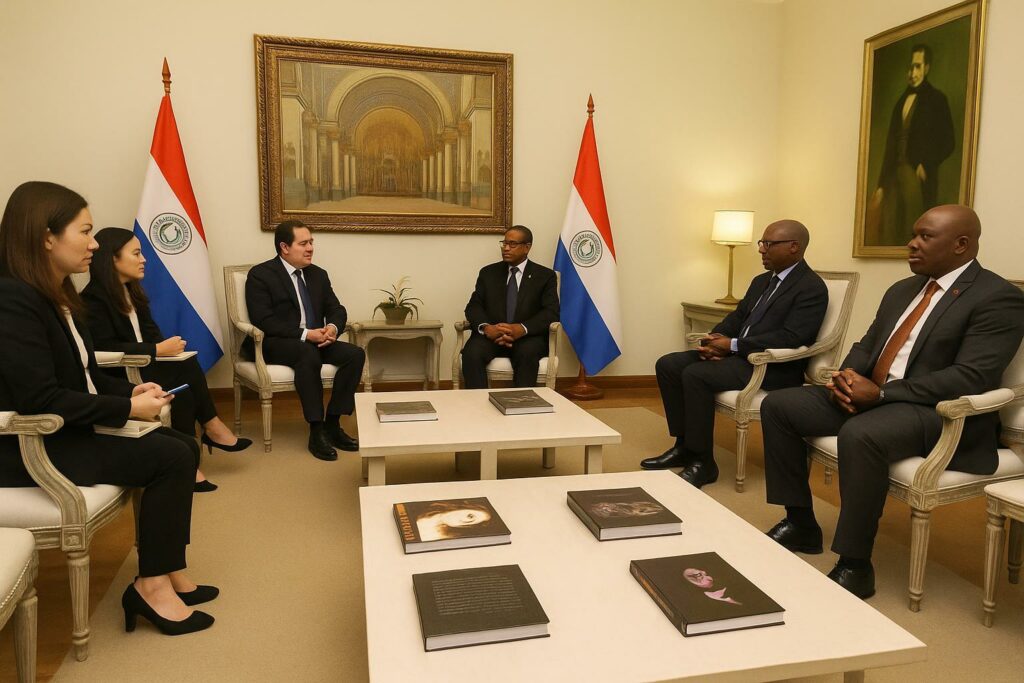High-Level Mission Courts Latin America
The Republic of Congo has entered a decisive phase in its campaign to steer Firmin Édouard Matoko toward the helm of the United Nations Educational, Scientific and Cultural Organisation. After a constructive stop in Santiago, Minister of State Pierre Mabiala—who also oversees Land Affairs and relations with Parliament—led a delegation to Asunción, the Paraguayan capital, on 10 September. By deploying a ministerial envoy rather than a purely diplomatic team, Brazzaville signalled that the race for UNESCO is not a routine posting but a priority dossier under the direct guidance of President Denis Sassou Nguesso.
The journey through Chile, Paraguay and soon Argentina embodies what one senior official in the Congolese foreign service describes as “horizontal diplomacy”: outreach that treats partners beyond traditional geographic spheres as strategic equals (official statement). For Latin-American capitals, the tour offers an occasion to engage Central Africa on education, science and culture policy rather than solely on commodity flows or security concerns.
Warm Reception in Asunción Enhances Bilateral Ties
At the Palacio Benigno López, headquarters of the Paraguayan Foreign Ministry, Minister Ruben Ramírez Lezcano greeted the Congolese envoy with honours customarily reserved for heads of government. According to participants, the atmosphere was “marked by frankness and cordiality,” a diplomatic shorthand indicating both sides felt free to explore future cooperation beyond the immediate UNESCO vote.
During the private segment of the meeting, Pierre Mabiala conveyed a sealed letter from President Sassou Nguesso to Head of State Santiago Peña. The missive, described by Congolese aides as highlighting Matoko’s managerial credentials and commitment to multilingualism, will, in the words of Minister Ramírez Lezcano, be transmitted to the Presidency “with the urgency befitting a matter of mutual interest.” Beyond the protocol, Asunción and Brazzaville reviewed possibilities for academic exchanges in tropical agronomy and digital heritage archiving—fields in which both nations face comparable challenges despite their geographic distance.
Paraguayan Praise for Matoko’s UNESCO Vision
Firmin Édouard Matoko is hardly unknown in Latin America. As Assistant Director-General for Priority Africa and External Relations at UNESCO, he has worked with several capitals on bilingual education projects. Minister Ramírez Lezcano emphasised that trajectory, stressing that Matoko “already speaks the language of consensus required in multilateral governance.” Such acknowledgement, offered in the presence of press cameras, is widely interpreted in diplomatic circles as a favourable signal, even if Paraguay’s final vote will be cast in Paris by its delegate to the Executive Board.
The Congolese delegation highlighted three pillars of Matoko’s programme: safeguarding intangible heritage through community-based digital tools; scaling STEM education for girls; and forging innovative financing partnerships with regional development banks. Observers noted that these priorities echo Paraguay’s own national development plan, thereby providing substantive grounds for alignment rather than a purely political bargain.
Le point juridique-économique sur la gouvernance UNESCO
Under the UNESCO Constitution, the Director-General is elected by the General Conference after a recommendation from the 58-member Executive Board. Each member state wields one vote, and campaign activities must respect the 2007 Ethical Framework preventing undue inducements. By opting for high-level but transparent outreach, Brazzaville stays within the permissible margin while showcasing its candidate’s expertise. Economically, a successful African bid could unlock fresh South-South cooperation funds, a prospect that resonates with Latin-American ministries of finance keen on diversifying cultural-industry revenue streams.
À retenir pour les partenaires africains et latino-américains
The stop in Asunción underscores a broader recalibration in Congolese diplomacy, marrying national prestige with concrete thematic cooperation. For Paraguay, the dialogue promises new technical partnerships in heritage preservation and agro-scientific education. For Congo-Brazzaville, every endorsement consolidates the narrative of an Africa that no longer arrives in multilateral arenas as petitioner but as agenda-setter. As Pierre Mabiala departed for Buenos Aires, he left behind more than a letter: he seeded a network of mutual interests that, if nurtured, could outlive the electoral calendar and enrich both shores of the Atlantic.

